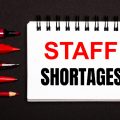
Social workers have begun a three-day strike over staffing levels in their service that their union describes as unsafe.
The walkout, from 8-10 May, marks an escalation of an existing dispute at Belfast Health and Social Care Trust that saw children and families practitioners start taking industrial action short of a strike last month.
“Long-term chronic understaffing has led to a position where the service is not being provided safely, staff are carrying excessive caseloads, and stress & illness are commonplace,” it added.
NIPSA has warned that action will be extended to the other four health and social care trusts if the Belfast strike does not resolve the issue.
The union said that about 40 social workers, working in child protection and looked-after children’s services, were taking part in the strike.
Longstanding social worker shortages
Staff shortages across children’s social work in the region is a longstanding issue, acknowledged by both employers and the Northern Ireland Executive (the devolved government). It was also highlighted in last year’s report of the Independent Review of Northern Ireland’s Children’s Social Care Services, led by Professor Ray Jones.
Combined vacancy and absence rates ranged from 26% to 41% in family intervention (child in need/child protection) teams, and from 21% to 86% in looked-after children’s teams across the five trusts, as of February 2023, said the review’s report, published in June 2023. Gateway (front door) teams across three of the five trusts had vacancy rates of 23%, 25% and 38% at the same time, it added, with Jones urging action to tackle a “workforce crisis”.
Progress since then has been stalled by the fact that devolved government was only restored in Northern Ireland, after a two-year hiatus, in February 2024, while health minister Robin Swann has described his department’s 2024-25 budget settlement, largely derived from a UK government block grant, as “entirely inadequate”.
‘We will take all possible steps to protect children’ – union head
However, NIPSA’s branch secretary at the Belfast trust, Damien Maguire criticised a failure of strategic planning by the region’s Department of Health (DoH) – which operated without a minister while devolved government was suspended – in dealing with an increase in demand for children’s social care on the back of the pandemic and cost of living crisis.
NIPSA held 11th hour talks with Swann before starting last month’s campaign of action short of a strike, but said that the “meeting did not reach a useful conclusion”.
“This escalation to strike action comes after a prolonged period of negotiations that has failed to address the staff shortage our members are experiencing,” said the union’s deputy general secretary, Patrick Mulholland. “It is our intention to take all possible steps to ensure children and families are protected and that our members are able to provide the high-level service they are committed to.”
Maguire, who is a social worker, said that resolving the staffing issue required caseload limits, a career pathway for hard-to-recruit areas, a radical cutting back of bureaucracy and investment in preventive services.
Trust praises social workers’ ‘professionalism, commitment, care and dedication’
In response to the strike, a spokesperson for the Belfast trust paid tribute to “the professionalism, commitment, care and dedication of our social workers working with children and families”.
They added: “Northern Ireland has a shortage of social workers which results in a high level of vacancies, and this has had a particular impact on the delivery of children’s services.”
The spokesperson said that the trust was working with regional organisations and the DoH to develop safe staffing guidance for services.
In a statement issued last month, ahead of NIPSA taking action short of a strike, a DoH spokesperson said Swann, in his meeting with the union had “underlined his commitment to making improvements where possible”.
Improvement ‘will be incremental’ – minister
The minister himself added: “I recognise the sustained pressures that social workers are facing. My department and health and social care trusts are undertaking a series of both short- and longer-term actions to ensure that social workers have safe and manageable workloads.
“This includes a programme of workforce and service reform to drive forward a range of improvements. However, improvement will be an incremental process and much of the work that we can take forward in this area, including commissioning more social work training places, is dependent on funding available to the department.”
NIPSA said it had held talks with the Belfast trust to ensure that “appropriate mitigations are in place to protect life and limb” during the strike.
This was echoed by the trust, whose spokesperson said: “We are working closely with our trade union colleagues to try and ensure that critical services are maintained in order to provide emergency cover for children and families during this period of industrial action.”




 Bournemouth, Christchurch and Poole
Bournemouth, Christchurch and Poole  Hampshire County Council
Hampshire County Council  Oxfordshire County Council
Oxfordshire County Council  South Gloucestershire Council
South Gloucestershire Council  Wokingham Borough Council
Wokingham Borough Council  Webinar: building a practice framework with the influence of practitioner voice
Webinar: building a practice framework with the influence of practitioner voice  ‘They don’t have to retell their story’: building long-lasting relationships with children and young people
‘They don’t have to retell their story’: building long-lasting relationships with children and young people  Podcast: returning to social work after becoming a first-time parent
Podcast: returning to social work after becoming a first-time parent  How managers are inspiring social workers to progress in their careers
How managers are inspiring social workers to progress in their careers  Workforce Insights – showcasing a selection of the sector’s top recruiters
Workforce Insights – showcasing a selection of the sector’s top recruiters 

 Facebook
Facebook X
X LinkedIn
LinkedIn Instagram
Instagram
About time Social Workers take industrial action to address working conditions that include being overburdened with cases and consequent unsafe practice
Until the system is changed and Tony Blairs “possible risk of future harm ” culture is changed and until social workers are trained to work with families then you won’t get social workers to join. These new social workers don’t want children out into care unless they can help it .they want the funds and resources to help the parents to keep their children. Then you will be able to empty and get good social workers. If this gets deleted we know that you don’t want to listen listen parents.
This is a long time coming. It’s the tip of the iceberg. Social workers for years in a variety of roles have been having to juggle with unmanageable caseloads. The system needs to change, the bureaucracy and form filling involved has become unmanageable alongside the increased demands on the services. Enough is enough.
Is the vacancy situation worsened by the decision to ban use of agency staff?
Don’t think that is a contributory factor. Hard reality is most students don’t want to work in frontline children’s services, whilst many of those working there leave after a few years. No lessons learned.
This is the only way to clearly demonstrate that Children’s and Adult’s Services are “broken” as a result of consistent inadequate investment. There has been report after report, enquiry after enquiry over many years that has brought no meaningful change beyond yet additional and unmanageable bureaucracy